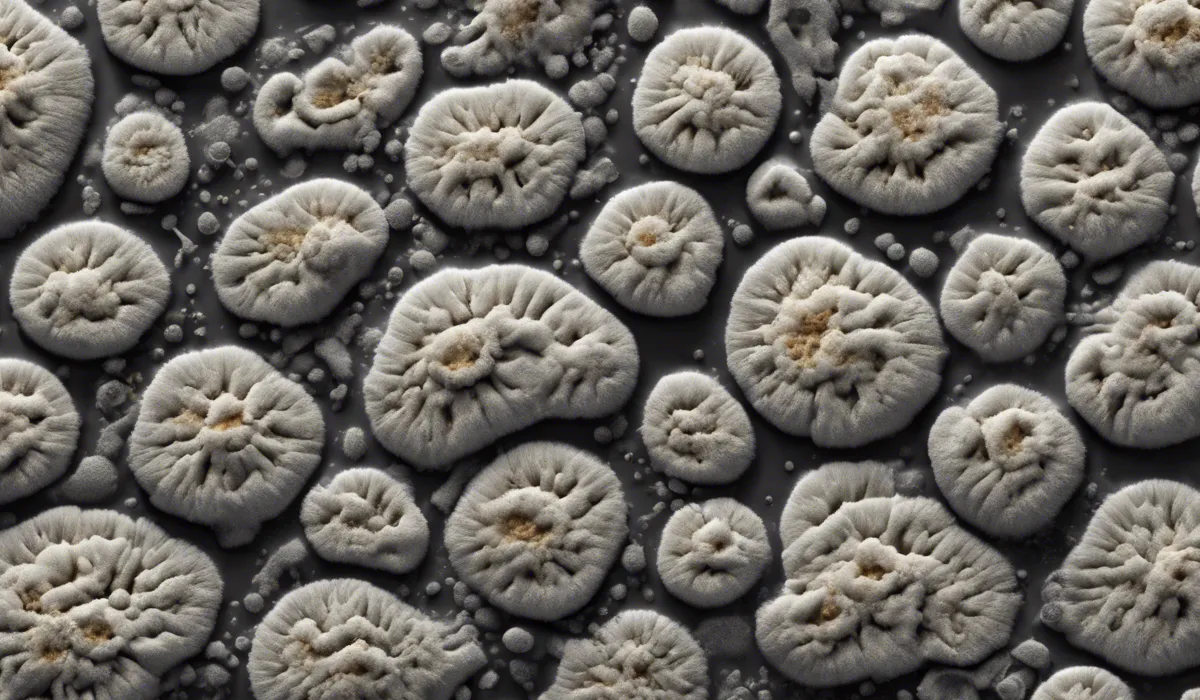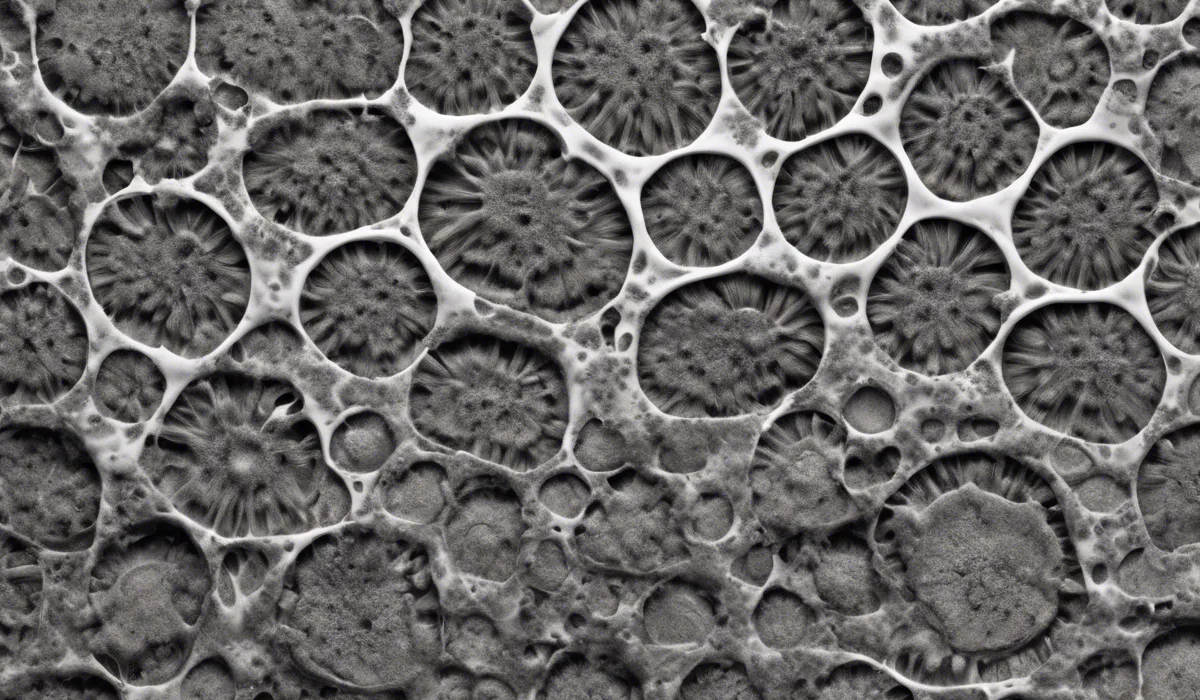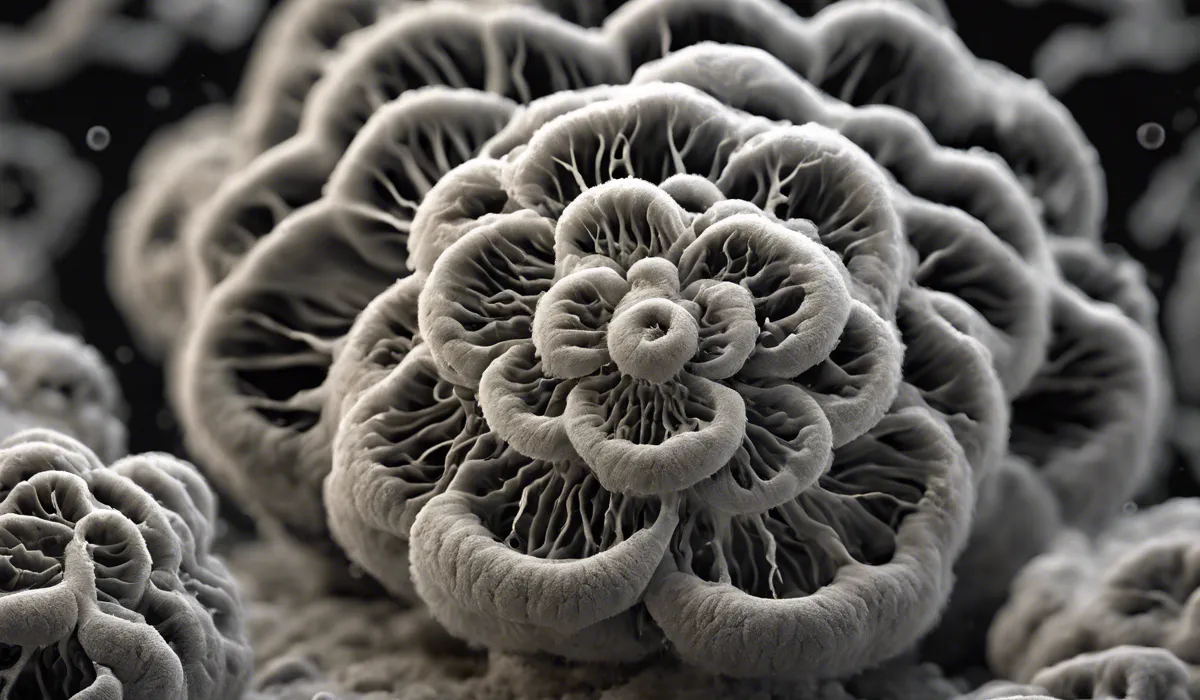HEPA filters effectively absorb mold spores from the air. These filters are designed to capture particles as small as 0.3 microns, trapping mold spores and reducing their presence in indoor environments.
Understanding Mold Spores

Definition of Mold Spores
Mold spores are tiny, lightweight particles that are the reproductive units of molds and fungi. They float through the air and can be found both indoors and outdoors.
Mold spores are so small that they can only be seen under a microscope. Despite their size, they play a significant role in the ecosystem by breaking down organic matter.
However, when they land in a suitable environment in our homes or workplaces, they can start to grow and become a problem.
Conditions for Mold Growth
Mold thrives in moist, warm, and humid conditions. It needs nutrients to grow, which can come from various sources like wood, paper, carpet, foods, and insulation.
When mold spores land on these nutrient-rich, damp surfaces in a warm environment, they can start to grow into colonies.
This growth can happen in as little as 24 to 48 hours, making it crucial to manage moisture and humidity to prevent mold proliferation.
Health Risks Associated With Mold Spores
Exposure to mold spores can cause a variety of health issues, especially for people with allergies, asthma, or compromised immune systems.
Common symptoms include sneezing, coughing, throat irritation, nasal congestion, and skin rashes. In more severe cases, mold exposure can lead to respiratory infections and worsen asthma symptoms.
Therefore, maintaining a mold-free environment is essential for ensuring good indoor air quality and protecting our health.
Methods to Absorb Mold Spores

Environmental Control
Reducing Humidity
One of the most effective ways to combat mold is by controlling indoor humidity levels. Keeping humidity below 50% can significantly reduce the chances of mold spores finding the right conditions to grow.
Use dehumidifiers and air conditioners to maintain a dry environment, and make sure to empty and clean these appliances regularly.
Fix any leaks and ensure proper insulation to prevent condensation, which can also contribute to excessive moisture.
Improving Ventilation
Proper ventilation helps reduce moisture and prevents mold spores from settling. Use exhaust fans in bathrooms and kitchens where moisture accumulates.
Open windows to allow fresh air to circulate and consider using ceiling or standing fans to keep air moving throughout your home.
This is particularly important in areas like basements and attics, where air can become stagnant and humidity can build up.
Natural Absorption Methods
Plants That Absorb Mold Spores
Some houseplants are known to help purify the air and can absorb mold spores. Plants like the peace lily, spider plant, and snake plant not only add a touch of greenery to your space but also help in cleaning the air.
However, it’s important to not overwater these plants, as excess moisture could contribute to mold growth in the soil.
Use of Baking Soda and Activated Charcoal
Baking soda and activated charcoal are natural products that can absorb moisture and odors, including those associated with mold.
Scatter baking soda in areas prone to dampness to help absorb moisture and neutralize odors.
Activated charcoal can be placed in small pouches around the home to help absorb mold spores from the air, reducing the likelihood of mold growth.
Mechanical Filtration
HEPA Filters
HEPA filters effectively absorb mold spores from the air. These filters are designed to capture particles as small as 0.3 microns, trapping mold spores and reducing their presence in indoor environments.
Make sure to regularly replace HEPA filters in your air purifiers and vacuum cleaners to maintain their effectiveness.
Air Purifiers With Mold-Specific Settings
Air purifiers equipped with mold-specific settings can make a significant impact on indoor air quality.
These devices often combine HEPA filtration with other technologies like UV-C light and ionizers to target and neutralize mold spores.
When choosing an air purifier, look for models with features designed to combat mold for the best results.
Preventative Measures and Maintenance

Regular Cleaning and Dusting
Keeping your home clean is a fundamental step in preventing mold growth. Dust and vacuum regularly to remove potential food sources for mold.
Pay special attention to damp areas and clean up any spills or moisture immediately. Use cleaning products designed to kill mold on surfaces, especially in bathrooms and kitchens where mold is more likely to grow.
Mold-Resistant Products
When renovating or repairing your home, consider using mold-resistant products. These can include paints, drywall, and insulation that are specifically designed to resist mold growth.
These products can be particularly helpful in areas that are prone to moisture, such as bathrooms, basements, and kitchens.
Professional Mold Remediation and Assessment
If you suspect a serious mold issue in your home, it’s wise to seek professional help. Mold remediation specialists can assess the situation and provide the necessary services to remove mold safely and prevent it from returning.
They have the expertise and equipment to handle large-scale mold problems, ensuring that your home remains safe and healthy.
FAQs About Mold Spore Absorption
What type of filter can absorb mold spores from the air?
HEPA filters are effective at absorbing mold spores from the air, as they are designed to capture particles as small as 0.3 microns.
How small of particles can HEPA filters capture?
HEPA filters can capture particles as small as 0.3 microns in size, which includes mold spores.
Are mold spores reduced in indoor environments with HEPA filters?
Yes, the presence of mold spores in indoor environments is reduced by using HEPA filters, as they trap these spores effectively.
Can I prevent mold exposure by using a HEPA filter?
Using a HEPA filter can significantly reduce your exposure to mold spores in the air, though it may not eliminate all sources of mold.
Is a HEPA filter a good investment for mold allergy sufferers?
Yes, a HEPA filter is a good investment for those suffering from mold allergies as it can help to decrease the amount of mold spores in the air.
Final Thoughts
HEPA filters are highly effective in absorbing mold spores from the air, providing a cleaner indoor environment.
Their design allows them to trap particles as tiny as 0.3 microns, which includes the size range of mold spores, thereby significantly reducing their presence and potentially improving air quality.
